- Home
- J. T. Edson
The Floating Outfit 25: The Trouble Busters (A Floating Outfit Western)
The Floating Outfit 25: The Trouble Busters (A Floating Outfit Western) Read online
The Home of Great Western Fiction!
It spelled trouble—in a big way.
Dusty Fog knew this when he agreed to become marshal of Mulrooney, Kansas—knew it and accepted it because he had good men at his back. Yet it seemed that not even the combined talents of Dusty Fog, Mark Counter, the Ysabel Kid, Waco and gambler Frank Derringer could handle the feud between Freddie Woods and her chief rival in the saloon business, Buffalo Kate.
The feud came to a rip-roaring, brawling head one day when Buffalo Kate faced Freddie and warned, “This town isn’t big enough for the both of us. One of us has to go!”
THE FLOATING OUTFIT 25: THE TROUBLE BUSTERS
By J. T. Edson
First published by Brown Watson in 1965
Copyright © 1965, 2018 by J. T. Edson
First Kindle Edition: July 2018
Names, characters and incidents in this book are fictional, and any resemblance to actual events, locales, organizations, or persons living or dead is purely coincidental.
All rights reserved. No part of this book may be reproduced or transmitted in any form or by any means, electronic or mechanical, including photocopying, recording or by any information or storage and retrieval system, without the written permission of the author, except where permitted by law.
This is a Piccadilly Publishing Book
Series Editor: Ben Bridges
Text © Piccadilly Publishing
Published by Arrangement with the Author’s Agent.
Table of Contents
Author’s Note
One – Crisis in Mulrooney
Two – A Chance for Mulrooney
Three – Brownton’s Chance
Four – Now Ask Me Another Question
Five – Pay-Off For the O.D. Connected
Six – I’ll Run Your Town – On My Terms
Seven – Dusty’s Welcome Mat
Eight – Waco’s Education
Nine – A Rival for Miss Woods
Ten – A Visitor From Brownton
Eleven – The Challenge
Twelve – A Drink Before Starting
Thirteen – The Wisdom of Buying a Sharps
Fourteen – Showdown for Two
Fifteen – Showdown in Brownton
About the Author
Author’s Note
While complete in itself, the events in this book run concurrently with those told in The Making of a Lawman.
One – Crisis in Mulrooney
‘I tell you, Miss Freddie, I saw a drive headed for Brownton this morning.’
The speaker leaned both hands on the polished top of the table as he spoke, looking across it at Freddie Woods who sat in the place of honor. Then he stiffened up again for he had no wish to show disrespect to the woman.
None of the men at the table wished to show anything but respect to Freddie. Most of them owed her something; all owed their presence in the town of Mulrooney, Kansas, to her persuasion and lead. It had been Freddie who stirred them up in their dying town back East, gave them the idea of moving out West and provided the incentive for them to make the journey to where they could found a town along the ever-advancing railroad, in the hope of waxing rich from the Texas trail drive trade.
And why not?
The herds from Texas must come to the railroad to find a market. There did not appear to be any reason why the trail bosses should not select Mulrooney as the point where they met the cattle-buyers from the East.
What then caused the concern among the members of the town council as they sat around a table in the comfortable, well-furnished dining-room of Freddie’s suite on the floor above her Fair Lady Saloon?
One thing. A small thing the Kansas City Land Office agent forgot to mention. Nothing much really; the kind of thing a man with his eye on a large commission as a result of so extensive a sale of land might be excused for overlooking.
There was a second town with exactly the same aims in mind not six miles west along the railroad track.
By the time the citizens of Mulrooney learned this detail, they had invested their savings in building stock-pens, homes, business premises of various kinds, a stout stone jail—which ought to pay for itself in fines levied against various law-breaking visitors—a strongly made, well-equipped bank where the cattle-buyers could leave their wealth in safety, and all the other amenities a trail-end town would need.
Brownton, the rival town, had much the same amenities and was built, as Mulrooney had been, ready for the start of another year’s trail drive season. Then both towns sat back and waited for the long-horned wealth of the Lone Star State to walk north into their hands. Both towns might survive, but that was doubtful. They were too close together and one would almost certainly receive the bulk of the trade while the other gradually starved out.
Now it seemed that the first drive of the year had gone into Brownton. The news brought the town council to Freddie’s rooms to convene a meeting and discuss ways and means of saving their investments.
‘The others will follow,’ Shadrack Birnbaum pointed out, nervously twisting a whisky glass between fat fingers.
‘Not necessarily,’ objected Cyrus Courtland, the big, burly and shrewd town banker. ‘From what I heard it was only a small local herd.’
Birnbaum shook his head. He was a small, fat, merry-looking man with an amazing capacity for worry. The only time Birnbaum seemed content was when he had a pile of worries gathered over his head.
‘But the hands from that herd will go down trail and tell others about Brownton,’ he said. ‘I don’t know much about cattle drives, but I can’t see a trail boss going looking for a town that might exist when he hears about another town that certainly exists. That’s logic.’
‘As you say, Shad,’ Freddie Woods answered. ‘That’s logic.’
Turning her grave face from Birnbaum, Freddie looked at the other men around the table. Courtland everlastingly chewing on his cigar; Schafer the hotel keeper drumming his fingers on the table top; Sherill, who with Birnbaum represented the storekeepers’ interests; Dongelon, owner of the only other saloon so far open, and Sanders, the railroad depot agent. She knew them all. Good men, intelligent men—but family men. Every one of them had come west at her instigation, leaving the semi-security of the crowded East in the hope of making a fortune on the plains of the Kansas range country. At her suggestion, every one of the men had sunk his savings into the town and Freddie had no wish to see them fail.
However, not one face showed a rat-like eagerness to desert a possibly sinking ship. Their town had been born—hatched might be a better word, for all hoped it would prove to be a golden egg—now all wanted to see it succeed, to grow, give them a living and become their permanent home.
‘I think we’re being unduly pessimistic, gentlemen,’ Freddie went on. ‘They do say that one swallow doesn’t make a summer.’
‘Maybe not, Miss Freddie,’ Birnbaum replied. ‘But that one trail drive might make Brownton.’
‘Possibly,’ Freddie agreed. ‘I’ve something to tell you in the strictest confidence. It must not go beyond these walls. The railroad plan to run a branch line up into Montana Territory, and Philip Chaseman, he’s head of construction, will build it from here or Brownton, whichever town seems most likely to succeed. I don’t need to point out that the town which gets the spur line will most certainly survive and grow.’
‘Then we have to get the trail drive trade,’ Courtland stated firmly.
‘How?’ asked Dongelon.
‘We might try sending riders out to scout for trail herds and give
the news about our town,’ Freddie suggested. ‘And there’s another point. The railroad don’t want to run their spur line from a wild, wide-open town.’
‘We’ll need a constable, or a marshal,’ Sherill said.
Any defeatist thoughts the others might have held departed as the town council settled down to discuss ways and means of gathering the trail drive trade and handling their town once customers began to flow in. After half an hour Freddie brought the meeting to a close.
‘So it stands this way, gentlemen,’ she said. ‘We will have the decision from Chaseman in four weeks. I propose that we hang on until then and put our plans for steering trail drives and other trade to town into operation. All in favor?’
A chorus of ‘ayes’ showed that the council stood unanimously behind their lady mayor. Rising from her chair, Freddie crossed the room and opened its door. A pretty little blonde girl stood before the door, bending at an angle which would have placed her eye, or ear, to the keyhole.
‘I was only tying me shoelace, Miss Freddie,’ she gurgled, straightening up and meeting her employer’s smiling eyes.
‘I’m sure you were, Babsy. Tell one of the girls to bring a tray of drinks up here, then come to my bedroom and help me change.’
Turning, Freddie entered the dining-room and passed through it to her bedroom. After delivering her boss’s orders to the bar, Babsy Smith followed Freddie and found her assistance in the capacity of maid was not required.
Mistress and maid were alike in one thing: their accents were British, not American. There any similarity ended. Freddie spoke with a cultured, upper-class accent and Babsy’s voice proclaimed the fact that she had been born well within the sound of Bow Bells.
Freddie stripped off the formal black dress which went with her official position as mayor. Under it she wore a daringly brief set of black lace underwear that did nothing to hide the magnificent body under it. She stood five foot seven, with black hair that was shorter than the current fashion and an almost faultlessly beautiful face. Her breasts rose in two gorgeous globes over a slender waist that needed no corset and which rose to rounded hips and shapely legs encased in black silk stockings, the black of her suspender straps making slashes down the white flesh of her thighs. All in all Miss Freddie Woods, lady mayor of Mulrooney, was a tolerable fine piece of woman-flesh.
Opening her clothes closet, Freddie took out a skin tight green dress which most certainly would not have done for the council’s meeting—although the male members might not have objected to her wearing it She donned the dress, it left her shoulders and arms bare and was cut low over the bosom, while a slit from floor to thigh allowed her legs to show in a pleasing and attractive manner.
Babsy looked like the kind of maid one saw in a French farce. Her blonde hair was taken up in a curly pile on top of her head and she had a pretty, mischievous and happy face with wide blue eyes that looked in a kind of open innocence at the world. Stripping off her formal—although she managed to make it look informal—maid’s dress revealed that Babsy wore cheaper, but just as brief, black underwear as her mistress.
‘Cor, Miss Freddie,’ Babsy said, throwing a glance at herself in the full-length closet mirror. ‘I wouldn’t half like to go down the Old Kent Road in this.’
‘You’d be arrested before you took two steps,’ Freddie replied and smoothed down her frock. ‘I’m not exactly dressed for a hunt ball, am I?’
‘You wouldn’t half set the local gentry going if you showed up like it, though. Not that you didn’t always, my la—Miss Freddie.’
Even after eighteen months Babsy occasionally almost slipped into the old manner of addressing her mistress. Freddie threw a warning glance at her companion, although she acknowledged that she was as much to blame as Babsy with her mention of hunt balls. While the Right Honorable Lady Winifred Amelia Besgrave-Woodstole attended hunt balls, Miss Freddie Woods did not
‘How’d it go, Miss Freddie?’ Babsy asked.
‘I thought you heard.’
‘Not all of it. I was only listening to see how long you’d be. What got them all so hot under the collar?’
‘The first trail drive has reached Brownton.’
‘Ooo-er!’ Babsy gasped, her wide eyes staring at her mistress, ‘That’s bad for us, isn’t it?’
‘It’s not good, that’s for sure. If we get the trade, we get the spur line for the railroad from here. If not—’
Freddie allowed her words to trail away although she never hesitated to take Babsy into her confidence. While the little blonde could, and sometimes did, act in a feather-headed fashion, she never discussed Freddie’s affairs. Babsy knew more about her mistress than any other living person. Back in England Babsy had held the minor and unimportant position of between-stairs maid, about the lowest of the low in British domestic hierarchy. Freddie picked the girl for her quick wits, courage and cheery disposition, when setting out to see some of the world. Since then she had never regretted the choice and doubted if any other of her family’s retainers could have made the transition from ‘tweeny’ to lady’s maid and companion with such ease and competence. Since Freddie became a saloonkeeper, the little blonde added to her duties by proving able to get up on a stage and sing and dance in a manner much appreciated by the saloon’s audiences.
‘Ready?’ Freddie asked on completing her clothing change.
‘Yes’m.’
‘Let’s go and see how trade is then.’
‘I just did,’ Babsy answered, her voice losing some of its merriment. ‘It’s not good.’
While walking down the stairs, Freddie looked around the large bar-room of her place. One thing which caught the eye was the complete absence of male help in the room. While Freddie hired swampers, old cowhands retired from riding the range, the men rarely appeared during the hours when the saloon was open to the public. For the rest, the games of chance were run by girls Freddie had trained.
Friendly smiles and nods greeted Freddie as she crossed the room, for she was more than a boss to her girls. She acted as banker, counselor, mother-confessor and adviser on affairs of the heart. Only once had she acted in another manner. Big Sarah, the red-haired head barmaid—Freddie’s name for her female bartenders—arrived shortly after the saloon opened and stated firmly she did not intend to take orders from a fancy-talking, sissy, dude Limey. Freddie let the matter ride until after the few customers left that night, then she invited Sarah to repeat the remarks. The resulting fight lasted for half an hour, although for the last five minutes Freddie had it all her own way. Strangely, Sarah respected Freddie after the licking she took and became one of the lady saloonkeeper’s stoutest supporters. The fight served two purposes; it brought Freddie a reliable boss bartender who really knew her stuff; it also warned off the other girls and none challenged Freddie’s right to give them orders after seeing what happened to Big Sarah.
There was only one customer in the big saloon. The saloon drew dribbles of trade from passing trains, railroad construction workers and chance drifters. On that day only one paying guest used the room. Somehow the emptiness of the room appeared to make him look larger than life. Not that he was a small man. In fact, Freddie was willing to admit she had never seen a finer physical specimen than her solitary customer.
He would stand at least six foot three, Freddie decided as she compared him with the waitress who cleared meal things from his table and ogled him with frank admiration. On sitting down, the customer had hung his expensive white Stetson hat, its low crown and wide brim fixed Texas-style, on the back of his chair. His golden blond hair was wavy and looked newly trimmed. Studying the man’s face, Freddie decided it was the most handsome she had ever seen, intelligent, strong-willed and virile as a Grecian god of old. His shoulders had a great spread to them, but he tapered down to a slim waist and long, powerful legs. In dress he spelled top hand Texas cowboy, but also something of a dandy. Freddie could tell silk when she saw it, and she saw it in the blond’s tight-rolled green bandana which trailed long
ends over his costly, made-to-measure tan colored shirt. All of his clothing looked expensive and he would have to buy it tailored to his giant’s frame to obtain so perfect a fit, for no store would carry his sizes as a stock item. The boots and gunbelt bore the look of having been made by a master-craftsman, yet were strictly functional. While the 1860 Army Colts in the belt’s contoured fast-draw holsters had ivory butts and the Best Citizens’ Finish of deep blue, Freddie gained the impression that they were not worn to impress people or merely to look good.
‘Adonis with the build of a Hercules,’ Freddie remarked, leaning on the bar and studying the big blond man.
‘Huh?’ grunted Big Sarah, who lacked a classical education.
‘Who is he?’ Freddie asked, realizing that she must have spoken her thought aloud, and turning to her head barmaid.
On the face of it, the question did not make much sense, Freddie decided. Her barmaid was unlikely to know the blond man. But Sarah did know him and her face showed some surprise that a gal as smart and knowing as her well-respected boss should profess ignorance of that handsome blond giant’s identity.
‘He ain’t that Adonis feller, Miss Freddie,’ Sarah answered. ‘That there’s Mark Counter. I remember him from the days when he worked as first deputy to Cap’n Dusty Fog up at Quiet Town.’ [i]
Two – A Chance for Mulrooney
Freddie had heard both names. One could not spend time in the range country without hearing about Dusty Fog and Mark Counter. What she recalled having heard of them in connection with the Texas cattle business caused Freddie to study the blond giant with fresh interest.
Although he was the son of one of the Texas Big Bend’s richest ranchers, and wealthy in his own right due to an eccentric maiden aunt leaving him all her considerable fortune in her will, Mark rode as an ordinary hand for Ole Devil Hardin’s O.D. Connected ranch. Maybe not as an ordinary hand exactly, he was a member of the elite of that tough and handy crew, the floating outfit, and counted second to Dusty Fog in the ranch’s hierarchy. If anything Mark could claim to be a slightly better cowhand than Dusty Fog. His strength was a legend and had built up a reputation of being a rangeland Hercules.

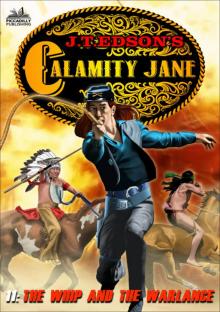 Calamity Jane 11
Calamity Jane 11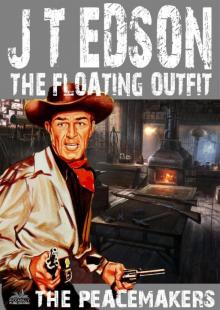 The Floating Outift 33
The Floating Outift 33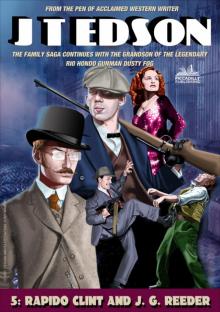 Cap Fog 5
Cap Fog 5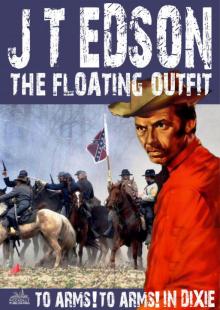 The Floating Outfit 34
The Floating Outfit 34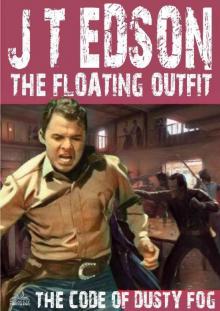 The Code of Dusty Fog
The Code of Dusty Fog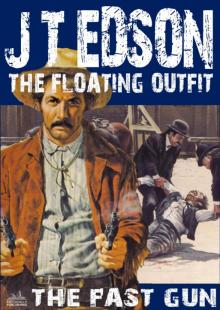 The Floating Outfit 21
The Floating Outfit 21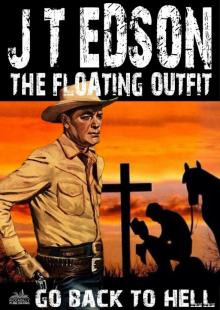 The Floating Outift 36
The Floating Outift 36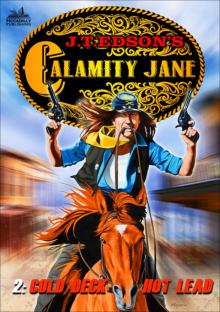 Calamity Jane 2
Calamity Jane 2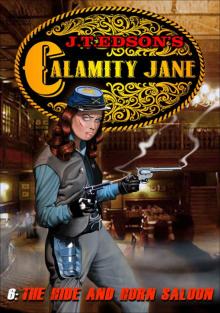 Calamity Jane 6: The Hide and Horn Saloon (A Calamity Jane Western)
Calamity Jane 6: The Hide and Horn Saloon (A Calamity Jane Western)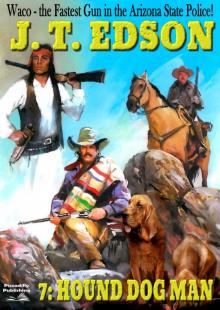 Waco 7
Waco 7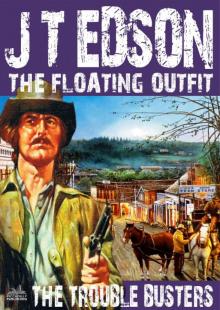 The Floating Outfit 25
The Floating Outfit 25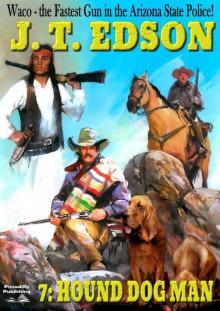 Waco 7: Hound Dog Man (A Waco Western)
Waco 7: Hound Dog Man (A Waco Western)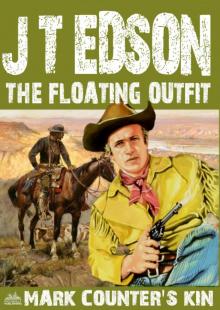 The Floating Outfit 47
The Floating Outfit 47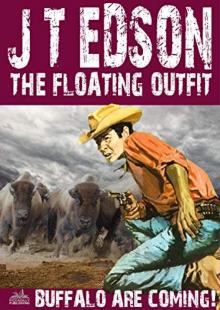 The Floating Outfit 42: Buffalo Are Coming!
The Floating Outfit 42: Buffalo Are Coming!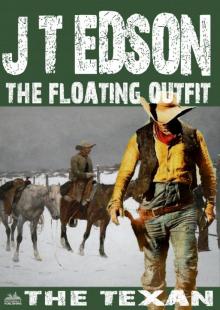 The Floating Outfit 46
The Floating Outfit 46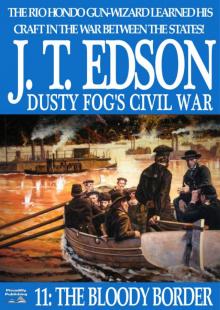 Dusty Fog's Civil War 11
Dusty Fog's Civil War 11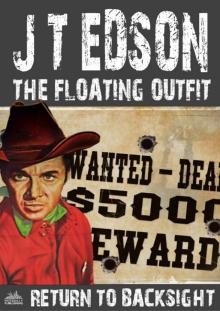 The Floating Outfit 61
The Floating Outfit 61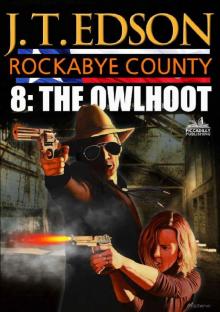 The Owlhoot
The Owlhoot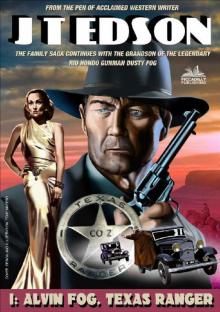 Alvin Fog, Texas Ranger
Alvin Fog, Texas Ranger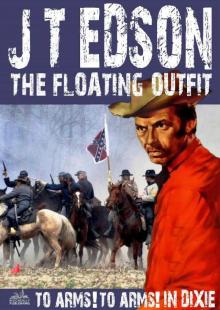 The Floating Outfit 34: To Arms! To Arms! In Dixie! (A Floating Outfit Western)
The Floating Outfit 34: To Arms! To Arms! In Dixie! (A Floating Outfit Western)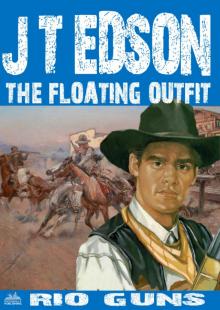 The Floating Outfit 44
The Floating Outfit 44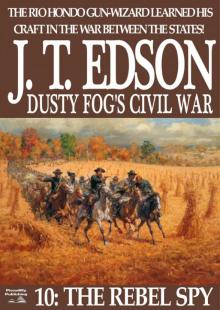 Dusty Fog's Civil War 10
Dusty Fog's Civil War 10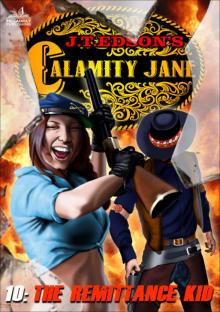 Calamity Jane 10
Calamity Jane 10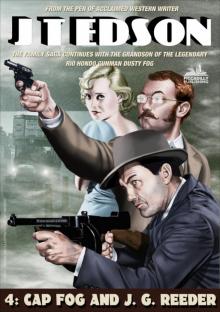 Cap Fog 4
Cap Fog 4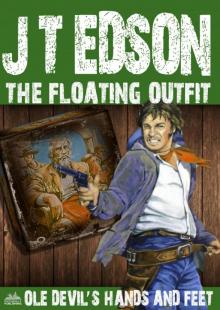 The Floating Outfit 51
The Floating Outfit 51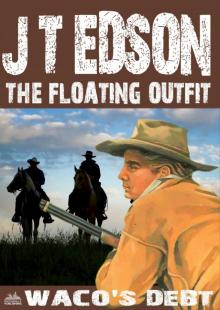 The Floating Outfit 50
The Floating Outfit 50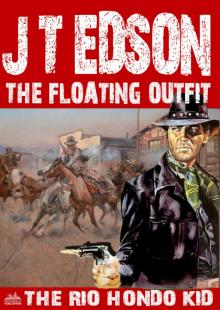 The Floating Outfit 49
The Floating Outfit 49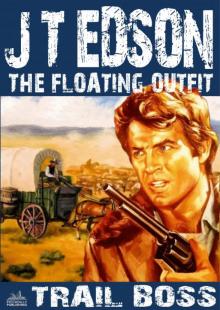 The Floating Outfit 10
The Floating Outfit 10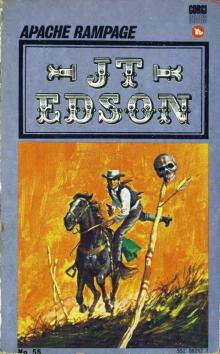 Apache Rampage
Apache Rampage The Floating Outfit 15
The Floating Outfit 15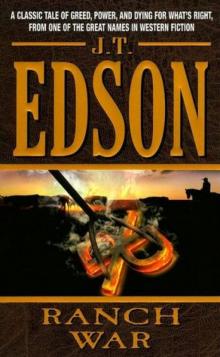 Ranch War
Ranch War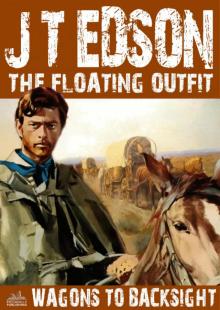 The Floating Outfit 11
The Floating Outfit 11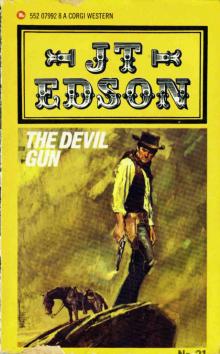 The Devil Gun
The Devil Gun Sacrifice for the Quagga God (A Bunduki Jungle Adventure Book 3)
Sacrifice for the Quagga God (A Bunduki Jungle Adventure Book 3)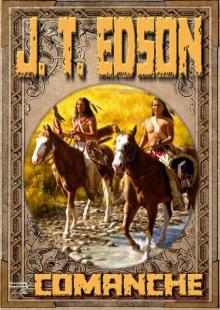 Comanche (A J.T. Edson Western Book 1)
Comanche (A J.T. Edson Western Book 1)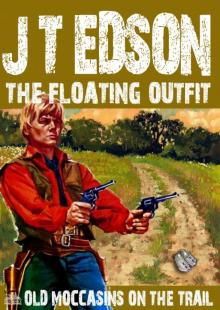 The Floating Outfit 48
The Floating Outfit 48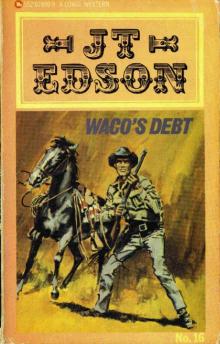 Wacos Debt
Wacos Debt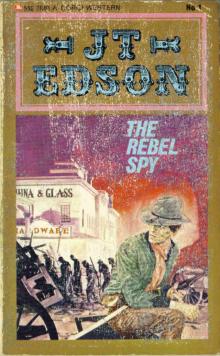 The Rebel Spy
The Rebel Spy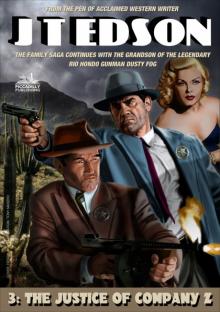 Cap Fog 3
Cap Fog 3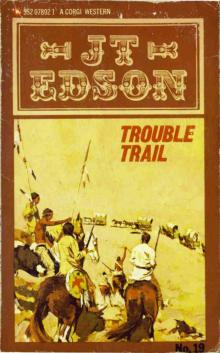 Trouble Trail
Trouble Trail Cold Deck, Hot Lead
Cold Deck, Hot Lead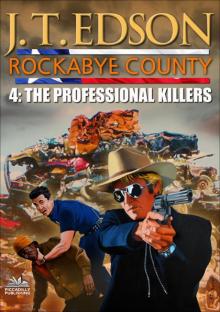 Rockabye County 4
Rockabye County 4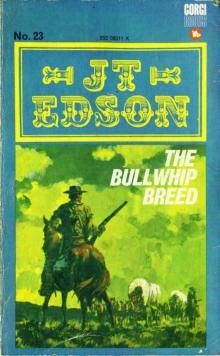 The Bullwhip Breed
The Bullwhip Breed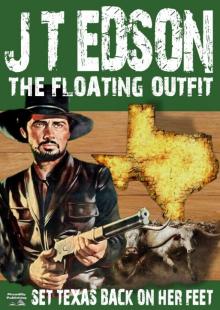 Set Texas Back On Her Feet (A Floating Outfit Western Book 6)
Set Texas Back On Her Feet (A Floating Outfit Western Book 6)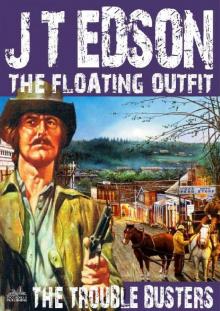 The Floating Outfit 25: The Trouble Busters (A Floating Outfit Western)
The Floating Outfit 25: The Trouble Busters (A Floating Outfit Western) Fearless Master of the Jungle (A Bunduki Jungle Adventure
Fearless Master of the Jungle (A Bunduki Jungle Adventure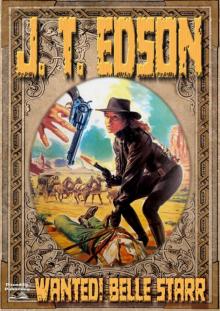 Wanted! Belle Starr!
Wanted! Belle Starr! The Big Hunt
The Big Hunt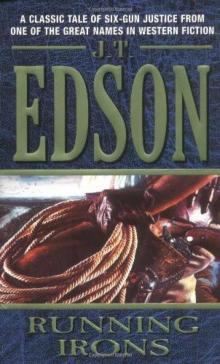 Running Irons
Running Irons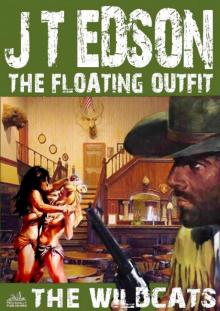 The Floating Outfit 19
The Floating Outfit 19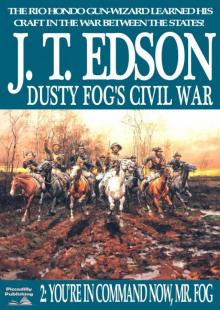 You're in Command Now, Mr Fog
You're in Command Now, Mr Fog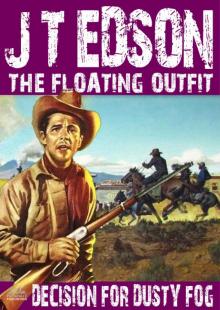 The Floating Outfit 27
The Floating Outfit 27 Texas Killers
Texas Killers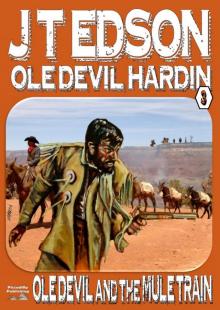 Ole Devil and the Mule Train (An Ole Devil Western Book 3)
Ole Devil and the Mule Train (An Ole Devil Western Book 3)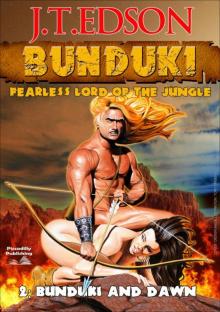 Bunduki and Dawn (A Bunduki Jungle Adventure Book 2)
Bunduki and Dawn (A Bunduki Jungle Adventure Book 2)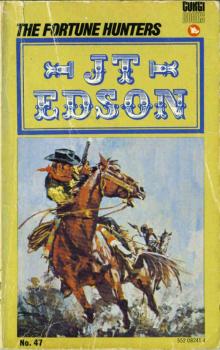 The Fortune Hunters
The Fortune Hunters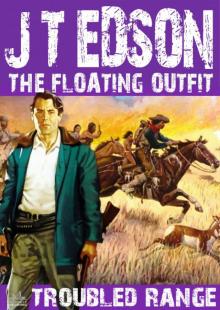 The Floating Outfit 12
The Floating Outfit 12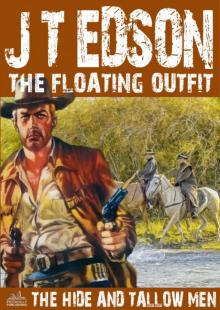 The Hide and Tallow Men (A Floating Outfit Western. Book 7)
The Hide and Tallow Men (A Floating Outfit Western. Book 7)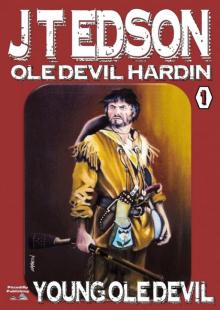 Young Ole Devil
Young Ole Devil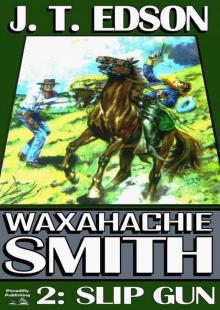 Slip Gun
Slip Gun The Drifter
The Drifter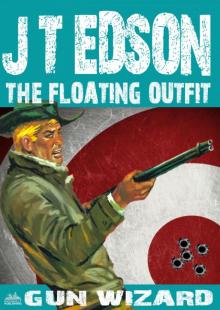 The Floating Outfit 45
The Floating Outfit 45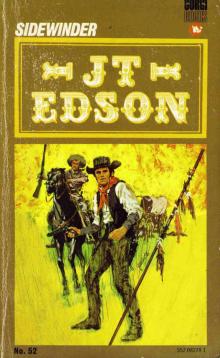 Sidewinder
Sidewinder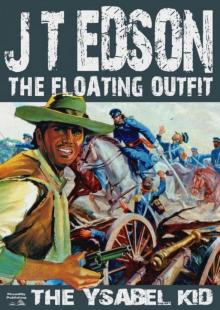 The Ysabel Kid
The Ysabel Kid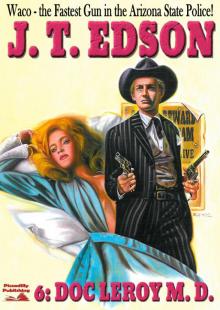 Waco 6
Waco 6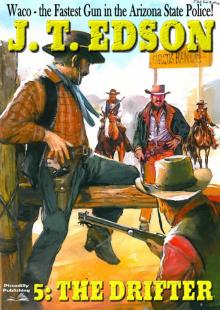 Waco 5
Waco 5 Point of Contact
Point of Contact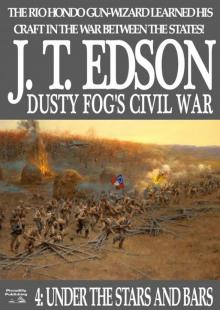 Under the Stars and Bars (A Dusty Fog Civil War Western Book 4)
Under the Stars and Bars (A Dusty Fog Civil War Western Book 4)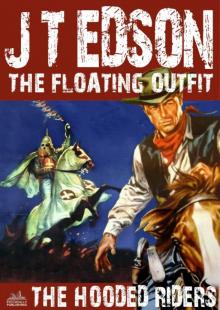 The Floating Outfit 9
The Floating Outfit 9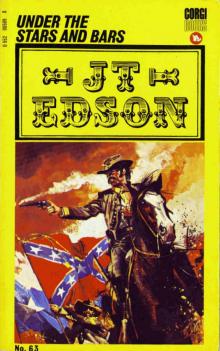 Under the Stars and Bars
Under the Stars and Bars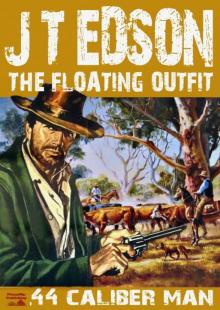 .44 Caliber Man
.44 Caliber Man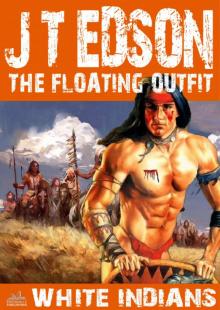 The Floating Outfit 17
The Floating Outfit 17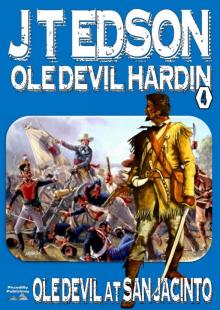 Ole Devil at San Jacinto (Old Devil Hardin Western Book 4)
Ole Devil at San Jacinto (Old Devil Hardin Western Book 4)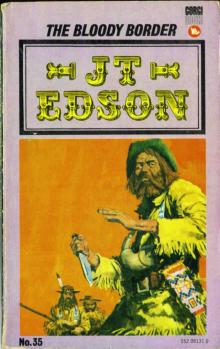 The Bloody Border
The Bloody Border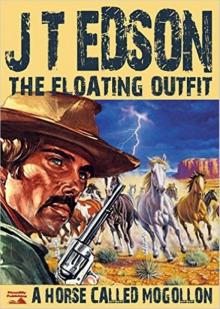 A Horse Called Mogollon (Floating Outfit Book 3)
A Horse Called Mogollon (Floating Outfit Book 3)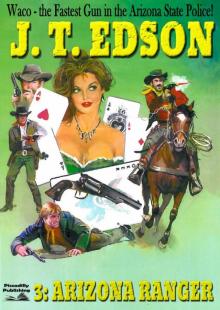 Waco 3
Waco 3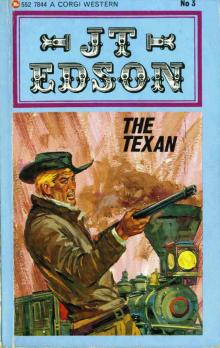 The Texan
The Texan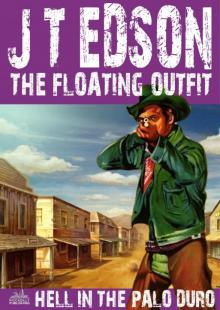 The Floating Outfit 35
The Floating Outfit 35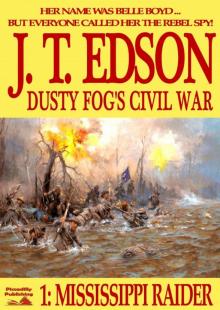 Mississippi Raider
Mississippi Raider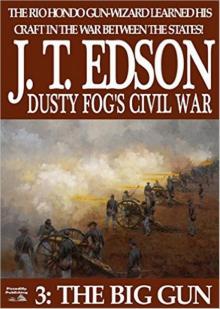 The Big Gun (Dusty Fog's Civil War Book 3)
The Big Gun (Dusty Fog's Civil War Book 3)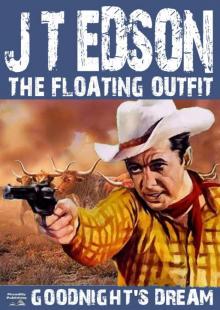 Goodnight's Dream (A Floating Outfit Western Book 4)
Goodnight's Dream (A Floating Outfit Western Book 4) Waco 4
Waco 4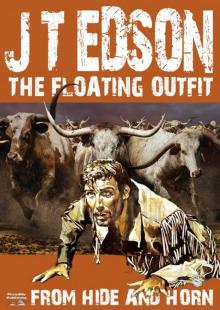 From Hide and Horn (A Floating Outfit Book Number 5)
From Hide and Horn (A Floating Outfit Book Number 5)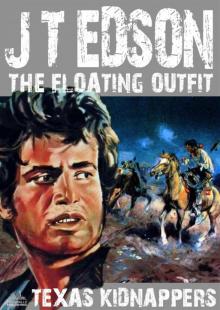 The Floating Outfit 18
The Floating Outfit 18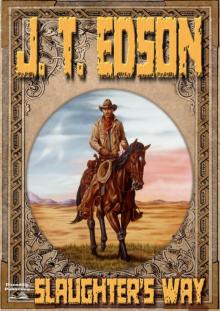 Slaughter's Way (A J.T. Edson Western)
Slaughter's Way (A J.T. Edson Western)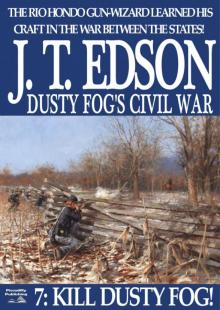 Dusty Fog's Civil War 7
Dusty Fog's Civil War 7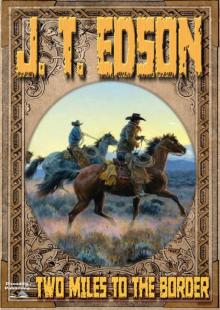 Two Miles to the Border (A J.T. Edson Western)
Two Miles to the Border (A J.T. Edson Western)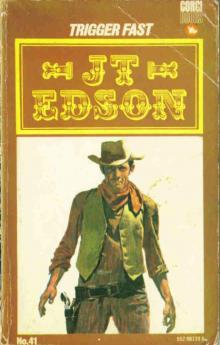 Trigger Fast
Trigger Fast Waco's Badge
Waco's Badge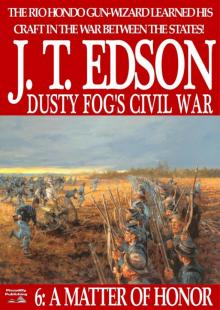 A Matter of Honor (Dusty Fog Civil War Book 6)
A Matter of Honor (Dusty Fog Civil War Book 6)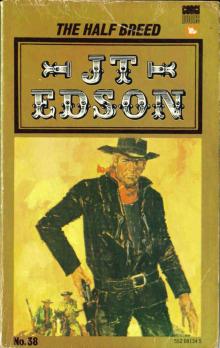 The Half Breed
The Half Breed Bunduki (Bunduki Series Book One)
Bunduki (Bunduki Series Book One)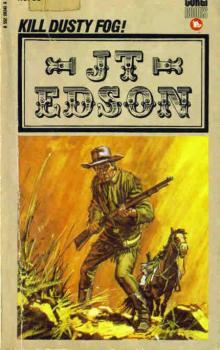 Kill Dusty Fog
Kill Dusty Fog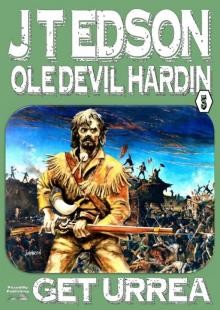 Get Urrea! (An Ole Devil Hardin Western Book 5)
Get Urrea! (An Ole Devil Hardin Western Book 5)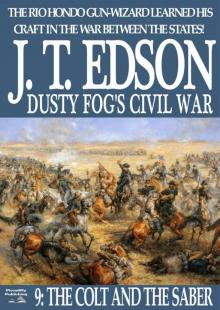 Dusty Fog's Civil War 9
Dusty Fog's Civil War 9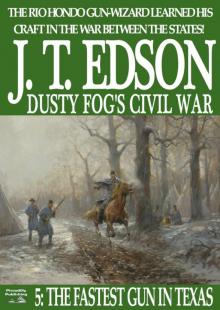 The Fastest Gun in Texas (A Dusty Fog Civil War Book 5)
The Fastest Gun in Texas (A Dusty Fog Civil War Book 5)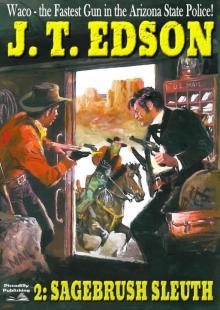 Sagebrush Sleuth (A Waco Western #2)
Sagebrush Sleuth (A Waco Western #2)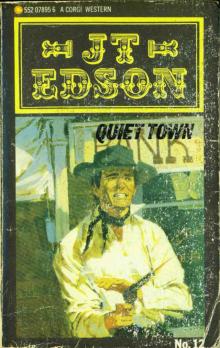 Quiet Town
Quiet Town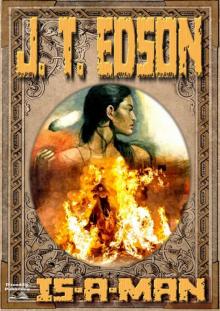 Is-A-Man (A J.T. Edson Standalone Western)
Is-A-Man (A J.T. Edson Standalone Western) Rockabye County 5
Rockabye County 5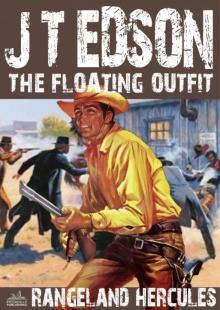 The Floating Outfit 14
The Floating Outfit 14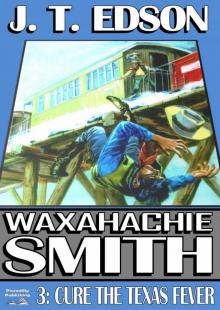 Cure the Texas Fever (A Waxahachie Smith Western--Book 3)
Cure the Texas Fever (A Waxahachie Smith Western--Book 3)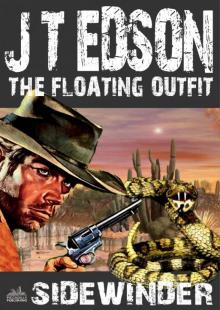 The Floating Outfit 13
The Floating Outfit 13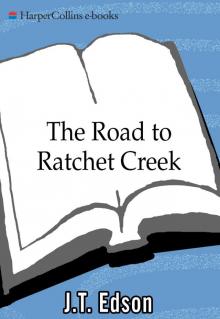 The Road to Ratchet Creek
The Road to Ratchet Creek